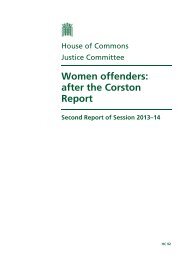Minority voices: Research into the access and acceptability of ... - MMC
Minority voices: Research into the access and acceptability of ... - MMC
Minority voices: Research into the access and acceptability of ... - MMC
- No tags were found...
You also want an ePaper? Increase the reach of your titles
YUMPU automatically turns print PDFs into web optimized ePapers that Google loves.
7. STUDY FINDINGS III: INFORMATION AND VIEWS FROM STAFFWORKING WITH YOUNG PEOPLE FROM BLACK AND MINORITYETHNIC GROUPSKey Findings• The importance <strong>of</strong> targeted promotion <strong>of</strong> services was highlighted in terms <strong>of</strong> improving <strong>access</strong>to <strong>and</strong> use <strong>of</strong> services by young people from Black <strong>and</strong> minority ethnic groups.• There is acknowledgement by many CAMHS that young people from Black <strong>and</strong> minority ethnicgroups are under-represented. The high dem<strong>and</strong>s facing CAMHS, <strong>and</strong> <strong>the</strong> lack <strong>of</strong> multi-culturalstaff mean that this issue is <strong>of</strong>ten left unaddressed. The crucial role played by <strong>the</strong> voluntarysector in supporting <strong>the</strong>se young people is also recognised.• It is widely appreciated that many young people from Black <strong>and</strong> minority ethnic groups only<strong>access</strong> support at a point <strong>of</strong> crisis <strong>and</strong> that different ways <strong>of</strong> working are needed to promote <strong>the</strong>identification <strong>of</strong> difficulties <strong>and</strong> <strong>the</strong> <strong>of</strong>fering <strong>of</strong> help at an earlier stage. For many servicesoperating at full capacity, this issue is difficult to address.• There are particular difficulties meeting <strong>the</strong> needs <strong>of</strong> young refugees <strong>and</strong> asylum seekersincluding difficulties dealing with <strong>the</strong>ir legal status, many <strong>and</strong> significant past traumaticexperiences <strong>and</strong> <strong>the</strong>ir general lack <strong>of</strong> underst<strong>and</strong>ing <strong>of</strong> how UK health <strong>and</strong> welfare services work.• Inter-agency working is thought to be improving in many areas but is being impeded bycompetition for resources, a lack <strong>of</strong> information about existing services <strong>and</strong> different agendasbetween agencies.• The value <strong>of</strong> having staff in CAMHS from different Black <strong>and</strong> minority ethnic groups is widelyrecognised but shortages <strong>of</strong> such staff, <strong>and</strong> difficulties with recruitment, are widespread.Recruitment has also been affected by funding shortages.• Many staff want more training in race equality <strong>and</strong> cultural competence. Greater pr<strong>of</strong>essionalunderst<strong>and</strong>ing <strong>of</strong> family concepts <strong>and</strong> structures within Black <strong>and</strong> minority ethnic communities isneeded if CAMHS are to work effectively with <strong>the</strong>se clients. It is also important that this trainingis ‘mainstreamed’ <strong>and</strong> is not left to individual initiatives or restricted to certain groups <strong>of</strong> staff.• A lack <strong>of</strong> interpreters <strong>and</strong> <strong>the</strong> availability <strong>of</strong> counselling in languages o<strong>the</strong>r than English affectsmany services.• The collection - <strong>and</strong> crucially <strong>the</strong> use - <strong>of</strong> ethnic monitoring data lacks consistency, with littleevidence <strong>of</strong> its systematic use in informing <strong>the</strong> development <strong>of</strong> mental health services forchildren <strong>and</strong> young people.Information was ga<strong>the</strong>red from 41 members <strong>of</strong> staff working in services located in <strong>the</strong> foursample areas. ii Additional information was also collected from three staff in non-sample areas,who assisted with <strong>the</strong> organisation <strong>and</strong> running <strong>of</strong> <strong>the</strong> additional two focus groups.The pr<strong>of</strong>essional backgrounds/agencies <strong>of</strong> those interviewed included:• CAMHS staff, including four consultant psychiatrists, one family <strong>the</strong>rapist, three clinicalpsychologists, one community link worker, two occupational <strong>the</strong>rapists, one specialistworker for substance misuse, one Director <strong>of</strong> CAMHS <strong>and</strong> two community psychiatricnurses.• Primary Care Trust staff - two commissioners for children’s services.iiTen staff returned <strong>the</strong>ir information via a postal questionnaire ra<strong>the</strong>r than a face to face interview.<strong>Minority</strong> Voices <strong>Research</strong> Report32
















